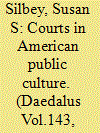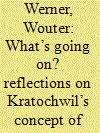| Srl | Item |
| 1 |
ID:
132773


|
|
|
|
|
| Publication |
2014.
|
| Summary/Abstract |
In American public imagination, courts are powerful but also impotent. They are guardians of citizens' rights but also agents of corporate wealth; simultaneously the least dangerous branch and the ultimate arbiters of fairness and justice. After recounting the social science literature on the mixed reception of courts in American public culture, this essay explains how the contradictory embrace of courts and law by Americans is not a weakness or flaw, nor a mark of confusion or naïveté. Rather, Americans' paradoxical interpretations of courts and judges sustain rather than undermine our legal institutions. These opposing accounts are a source of institutional durability and power because they combine the historical and widespread aspirations for the rule of law with a pragmatic recognition of the limits of institutional practice; these sundry accounts balance an appreciation for the discipline of legal reasoning with desires for responsive, humane judgment.
|
|
|
|
|
|
|
|
|
|
|
|
|
|
|
|
| 2 |
ID:
112379


|
|
|
|
|
| Publication |
2012.
|
| Summary/Abstract |
This article focuses on the understudied area of Internet-facilitated judicial transparency and its implications for the right to know, the citizen's engagement with China's court system, and the related development of competent legal reasoning. The analytical focus is on recent China Supreme People's Court regulations bolstering open reporting on court websites. This article explores the scope and quality of this reform, comparing it with earlier 'open trial' initiatives and investigating its origins and its contemporary implications, both in terms of generating public confidence in fair trial and furthering the development of legal education inside and outside of the legal system. The Internet may help to circulate an improved legal reasoning within the judiciary as well as support a more informed public understanding of the law's requirements. Openness may pressure judges into a wider process of research and learning as they are more exposed to public scrutiny. At the same time it may well expose the extant level of legal incompetence in China's new legal system.
|
|
|
|
|
|
|
|
|
|
|
|
|
|
|
|
| 3 |
ID:
144069


|
|
|
|
|
| Summary/Abstract |
This article focuses on two conceptual puzzles that arise out of Kratochwil’s concept of law. The first is the dual meaning of the questions ‘what is the law’ and ‘what is society’? I will argue that a sociological approach to these questions is unable to do justice to the specific position of the legal practitioner, for whom then these questions are first and foremost normative ones with possible far-reaching implications. The second is the relation between the validity and the binding force of law. In line with institutional approaches to law, I argue that legal language cannot be reduced to one form of linguistic practice, the production of binding decisions and norms of conduct. I will show how a broader conception of law as a form of linguistic activity opens up new research agendas in (international) law.
|
|
|
|
|
|
|
|
|
|
|
|
|
|
|
|